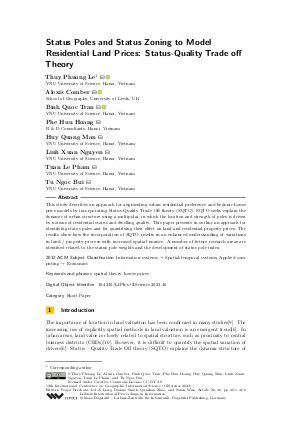Status Poles and Status Zoning to Model Residential Land Prices: Status-Quality Trade off Theory (Short Paper)
Authors
Thuy Phuong Le  ,
Alexis Comber
,
Alexis Comber  ,
Binh Quoc Tran
,
Binh Quoc Tran  ,
Phe Huu Hoang,
Huy Quang Man,
Linh Xuan Nguyen,
Tuan Le Pham,
Tu Ngoc Bui
,
Phe Huu Hoang,
Huy Quang Man,
Linh Xuan Nguyen,
Tuan Le Pham,
Tu Ngoc Bui
-
Part of:
Volume:
12th International Conference on Geographic Information Science (GIScience 2023)
Part of: Series: Leibniz International Proceedings in Informatics (LIPIcs)
Part of: Conference: International Conference on Geographic Information Science (GIScience) - License:
 Creative Commons Attribution 4.0 International license
Creative Commons Attribution 4.0 International license
- Publication Date: 2023-09-07
File

PDF
LIPIcs.GIScience.2023.46.pdf
- Filesize: 1.63 MB
- 6 pages
Document Identifiers
Subject Classification
ACM Subject Classification
- Information systems → Spatial-temporal systems
- Applied computing → Economics
Keywords
- spatial theory
- house prices
Metrics
- Access Statistics
-
Total Accesses (updated on a weekly basis)
0Document
0Metadata
Abstract
This study describes an approach for augmenting urban residential preference and hedonic house price models by incorporating Status-Quality Trade Off theory (SQTO). SQTO seeks explain the dynamic of urban structure using a multipolar, in which the location and strength of poles is driven by notions of residential status and dwelling quality. This paper presents in outline an approach for identifying status poles and for quantifying their effect on land and residential property prices. The results show how the incorporation of SQTO results in an enhanced understanding of variations in land / property process with increased spatial nuance. A number of future research areas are identified related to the status pole weights and the development of status pole index.
Cite As Get BibTex
Thuy Phuong Le, Alexis Comber, Binh Quoc Tran, Phe Huu Hoang, Huy Quang Man, Linh Xuan Nguyen, Tuan Le Pham, and Tu Ngoc Bui. Status Poles and Status Zoning to Model Residential Land Prices: Status-Quality Trade off Theory (Short Paper). In 12th International Conference on Geographic Information Science (GIScience 2023). Leibniz International Proceedings in Informatics (LIPIcs), Volume 277, pp. 46:1-46:6, Schloss Dagstuhl – Leibniz-Zentrum für Informatik (2023)
https://doi.org/10.4230/LIPIcs.GIScience.2023.46
BibTex
@InProceedings{le_et_al:LIPIcs.GIScience.2023.46,
author = {Le, Thuy Phuong and Comber, Alexis and Tran, Binh Quoc and Hoang, Phe Huu and Man, Huy Quang and Nguyen, Linh Xuan and Le Pham, Tuan and Bui, Tu Ngoc},
title = {{Status Poles and Status Zoning to Model Residential Land Prices: Status-Quality Trade off Theory}},
booktitle = {12th International Conference on Geographic Information Science (GIScience 2023)},
pages = {46:1--46:6},
series = {Leibniz International Proceedings in Informatics (LIPIcs)},
ISBN = {978-3-95977-288-4},
ISSN = {1868-8969},
year = {2023},
volume = {277},
editor = {Beecham, Roger and Long, Jed A. and Smith, Dianna and Zhao, Qunshan and Wise, Sarah},
publisher = {Schloss Dagstuhl -- Leibniz-Zentrum f{\"u}r Informatik},
address = {Dagstuhl, Germany},
URL = {https://drops.dagstuhl.de/entities/document/10.4230/LIPIcs.GIScience.2023.46},
URN = {urn:nbn:de:0030-drops-189415},
doi = {10.4230/LIPIcs.GIScience.2023.46},
annote = {Keywords: spatial theory, house prices}
}
Author Details
References
-
TQ Bui, HN Do, and PH Hoang. House price estimation in hanoi using artificial neural network and support vector machine: in considering effects of status and house quality [paper presentation]. In FIG Working Week, 2017.

-
A Comber, P Harris, N Quan, K Chi, T Hung, and HH Phe. Local variation in hedonic house price, hanoi: a spatial analysis of sqto theory. In International Conference on GIScience: Short paper proceedings, volume 1, pages 54-59, 2016.

-
Diane Hite, Wen Chern, Fred Hitzhusen, and Alan Randall. Property-value impacts of an environmental disamenity: the case of landfills. The Journal of Real Estate Finance and Economics, 22:185-202, 2001.

-
Hoang Huu Phe and Patrick Wakely. Status, quality and the other trade-off: Towards a new theory of urban residential location. Urban studies, 37(1):7-35, 2000.

-
Hironori Kato and Le Hong Nguyen. Land policy and property price in hanoi, vietnam. Journal of the Eastern Asia Society for Transportation Studies, 8:1011-1026, 2010.

-
Andy L Krause and Christopher Bitter. Spatial econometrics, land values and sustainability: Trends in real estate valuation research. Cities, 29:S19-S25, 2012.

-
Thuy P Le. Research on urban residential land valuation from viewpoint of Status - Quality Trade Off theory, case study in Cau Giay District, Hanoi City. PhD thesis, VNU University of Science, Vietnam National University, Hanoi Vietnam, 2021.

-
Thuy P Le, Phe H Hoang, Linh X Nguyen, Tu N Bui, Tuan L Pham, and Binh Q Tran. Urban quality of life evaluation using land price with status-quality trade-off theory and ecosystem services. International Journal of Strategic Property Management, 27(2):92-104, 2023.

-
Andreas Ortner, Matthias Soot, and Alexandra Weitkamp. Determining land values by location: Supporting public valuation expert committees in the provision of market transparency. The role of public sector in local economic and territorial development: Innovation in central, Eastern and South Eastern Europe, pages 83-96, 2019.

-
Paul F Wendt. Theory of urban land values. Land economics, 33(3):228-240, 1957.

